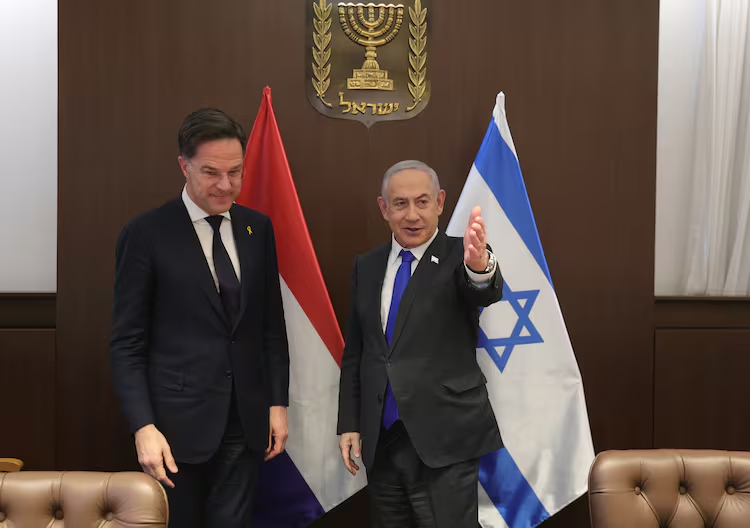Former Prime Minister Mark Rutte and Israeli Prime Minister Benjamin Netanyahu during a meeting in Jerusalem - ANP / EPA
This opinion piece originally appeared in de Volkskrant
Contradiction, chaos, disagreement, and fierce (internal) debates we know by now from our current cabinet. The cabinet's decision, at the insistence of PVV leader Geert Wilders, to move the Dutch embassy in Israel from Tel Aviv to Jerusalem is a good example. Not only from the opposition but also within the coalition, objections and conditions have been raised.
It is no secret that our current cabinet supports the Israeli government, especially Wilders, who is very openly pro-Israel and has, for years, supported the idea of Jerusalem as Israel's capital. So the decision in the coalition agreement to move the Dutch embassy in Israel from Tel Aviv to Jerusalem does not come from unexpected quarters.
A salient detail is that Foreign Minister Caspar Veldkamp was himself ambassador at the Dutch embassy in Tel Aviv.
Contentious
So although the proposal is no surprise, it is highly controversial. Jerusalem is currently not the official capital of Israel and is divided into West and East Jerusalem. Israel annexed East Jerusalem in 1967 and built illegal settlements there. The international community, including the United Nations, does not recognise this annexation and still considers East Jerusalem as occupied Palestinian territory, to serve as the shared capital for a future Palestinian state.
The coalition agreement of the cabinet mentions that the Dutch embassy will be relocated at an 'appropriate time'. This announcement is surrounded by other statements, perhaps meant to be soothing, such as that the cabinet does "adhere to international (humanitarian) law" and still stands for a sustainable two-state solution.
How can these statements stand together?
According to former ambassador to the Middle East, Nikolaos van Dam, moving the embassy to Jerusalem amounts to "recognition of the Israeli annexation of East Jerusalem and an undermining of international law". The decision to indeed move the embassy to Jerusalem and recognise the annexation puts a two-state solution with a shared capital for Palestine, which the cabinet says it stands for, further out of the picture.
But beyond the problematic impact on the region, this proposal also has an impact on national Dutch politics. The PVV in particular, led by Wilders, is putting pressure on the other governing parties to agree with far-reaching proposals.
Chaotic
Many MPs and Jerusalem residents therefore see the cabinet as unprofessional and messy. But is there more behind this politically recalcitrant behaviour? The kindergarten class, as the cabinet is regularly called by critics, is perhaps an underestimation of the intent and thoughtfulness of the cabinet's apparent 'inanity'.
By publicly attacking his own team and coalition partners from day one, Wilders is clearly opting for a strategy of chaos. A 'lost' battle can mobilise supporters and fuel frustration towards all those 'enemies'. Chaos and unpredictability are strong weapons for a populist and while chaos increases, the supporters remain loyal and enthusiastic.
How does this politics of chaos impact the international position of the Netherlands?
A move of the embassy will weaken the Dutch position abroad. By moving the embassy to Jerusalem, the Netherlands joins countries that, according to former foreign minister, Ben Bot, are 'not exactly high up the pecking order'.
Budget cuts that the new coalition will implement on, for example, development cooperation, are going to amplify this effect. Our government will be taken less and less seriously on the international stage and therefore get less done in various areas, for instance in Europe, or at the United Nations.
This foreign strategy may temporarily benefit the PVV electorally, but it will not serve the real interests of the Netherlands. Even if the relocation of the Dutch embassy to Jerusalem does not go ahead, damage has already been done to our international position. It is to be hoped that Foreign Minister, Caspar Veldkamp, will be able to find a diplomatic way out of this situation.




